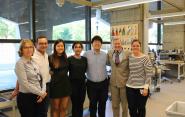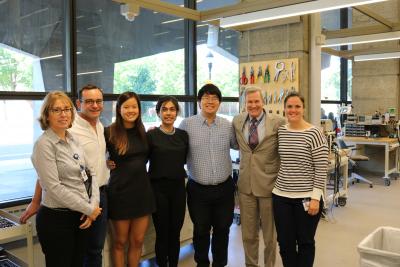2016 CEID Fellows Make Telemedicine App to Improve Life After Transplants

Members of the fourth cohort of the Yale School of Engineering & Applied Science's Summer Design Fellowship made their final presentations last week. The 12 students in residence at the Center for Engineering Innovation & Design comprised five teams, each working on a specific project for eight weeks. The Summer Design Fellowship is unique in that student teams are provided the resources to create hardware and software solutions for a specific problem, as opposed to working on previously established research projects. It is the only fellowship specifically designed to assist "makers" at Yale. Here is the third part of our article on the final presentations.
Virtual Interactive Platform (VIP) Transplant
The VIP Transplant team - Zobia Chunara ‘16, Lilium Wu ‘19 and Jefferson Zou ‘17 – presented their telemedicine app, designed to allow Yale-New Haven Transplantation Center (YNHTC) patients conduct virtual visits with and message their provider team, manage their medications, and access educational information on their post-transplant care. Dr. David Mulligan, Chief of Transplantation & Immunology at Yale-New Haven Hospital, serves as the team's advisor.
 “We’re focusing on the post-transplant experience,” Wu said. “Once a patient has received a kidney or liver transplant at Yale-New Haven Hospital, their journey has basically just started.”
“We’re focusing on the post-transplant experience,” Wu said. “Once a patient has received a kidney or liver transplant at Yale-New Haven Hospital, their journey has basically just started.”
During the first month after surgery, patients come back to YNHTC approximately two to three times a week to consult with their health care providers. During their second month, visits drop down to two times or once a week. Typically, transplant patients end up coming back to Yale about 25 times over the course of six months post-surgery.
It adds up to a significant amount of resources.
“Thanks to Dr. Mulligan’s access to the Transplantation Center at Yale-New Haven Hospital, we were able to quantify just what transplant patients go through,” Chunara said.
From interviewing 30 transplant patients, they found that YNHTC patients spend an average of 5.4 hours traveling to the appointments and in the waiting rooms. Additionally, they lose about $688 each in transportation and parking costs over the first few months post-transplant.
“Our solution to reduce these costs was to develop an all-in-one telemedicine application,” Zou said. “The most important feature is videoconferencing, to reduce the patients’ amount of travel.”
The app allows patients to meet their health care providers through 15- to 20-minute video conferences. It also includes a messaging function that allows patients to ask any follow-up questions they might have either during or after the virtual visit. Beyond communicating with their provider team, patients can track their prescribed medications with, and access an education center with post-transplant care information.
The team members said they were originally hoping for an app that provided the equivalent quality of care as in-person visits. But in the surveys, many patients indicated that they preferred the virtual visits over the in-person ones because of the time and cost they saved on travel to YNHTC.
Currently, the YNHTC Team is using the VIP Transplant app with its patients. Dr. Mulligan commented that the app has exceeded their expectations and allowed patients the flexibility to keep up with their care as part of their routine.
“No one’s ever done this with transplant patients before,” he said. Now, he said, doctors can visit with their patients “without causing more patient dissatisfaction because they’re driving for hours, and spending hours in the waiting room.”
While the YNHTC team continues its virtual visits on the app, the VIP Transplant Team looks forward to working with YNHTC pharmacists to build out the Medications Section of the app, to help patients keep track of their long list of prescriptions.
“By focusing on and perfecting a narrow use case such as transplant, we are well on our way to proving the impact that telemedicine can have on the way patients manage their care,” Chunara said.
As they continue to bring telemedicine to YNHTC, the VIP Transplant Team has support and funding from the Yale Entrepreneurial Institute, the Yale Center for Engineering, Innovation, and Design, and the Yale Center for Biomedical and Interventional Technology.

